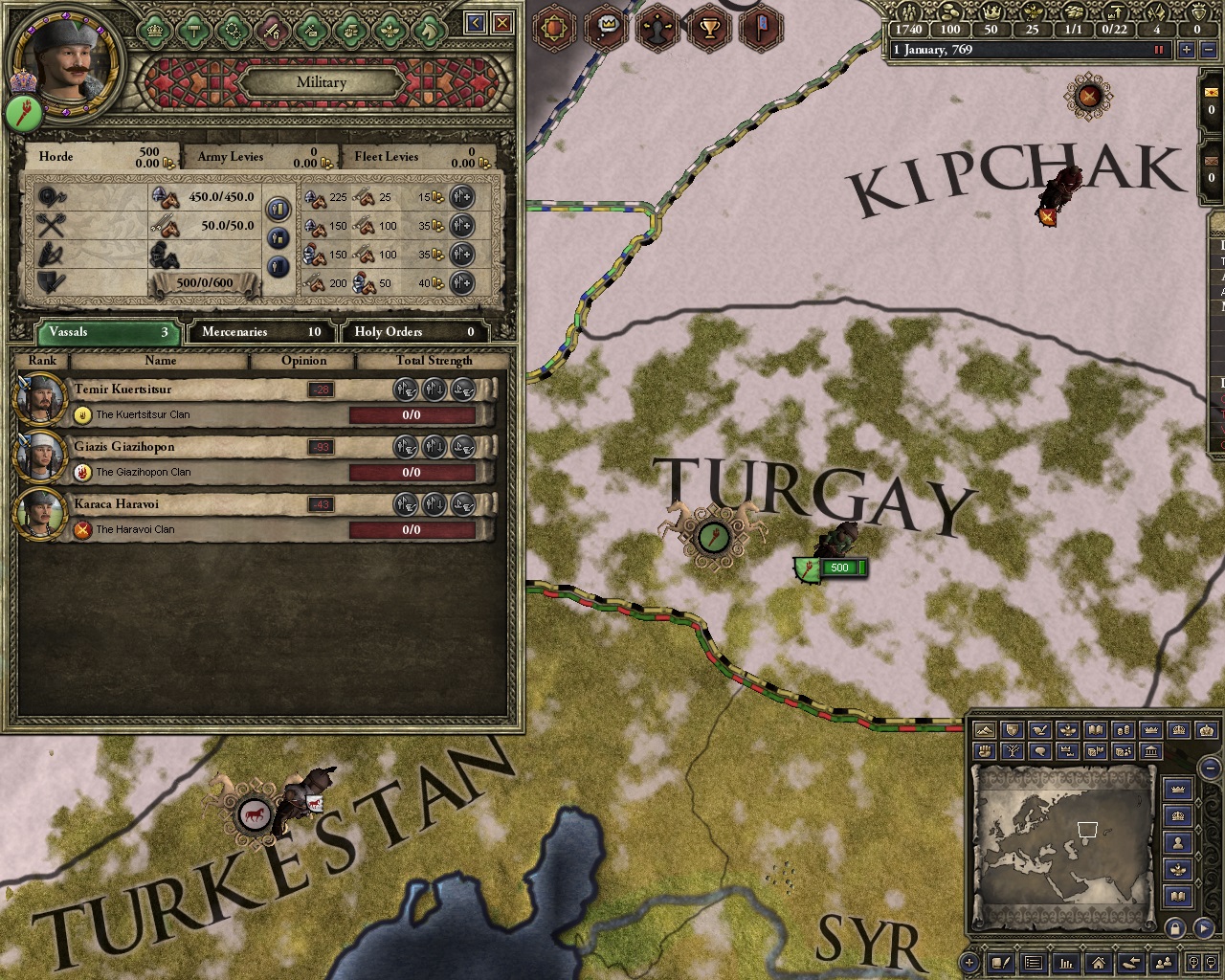It's time for the weekly dev diary and this time it's a biggie, as we proudly announce Horse Lords, the new Crusader Kings II expansion! So what makes the proud rulers of the endless steppes unique? Well, in short, their relative lack of permanent settlements. This expansion gives the nomadic peoples of the steppes a unique type of gameplay which is not centered around Castles, Temples and Cities at all. Playing as a Nomad, you are allowed to conquer and even own normal Holdings, but they are worth little to you except as vassal cash cows. What you really care about is more grazing land for your sheep and horses. Thus, nomad hordes simply have a total population, which grows relative to how many empty Holding slots exist in your provinces (steppe provinces are best, but some other terrain types are also acceptable).

A large fraction of your total Population counts as your Manpower, which is used to raise your regiments (much like the Retinue system.) Of course, if all your fighting men are dead, it will be a while before your Manpower replenishes! War on the steppes is fast and fluid; you only occupy an empty province for as long as one of your armies is standing there, or if you build a fort there to lock it down... and even then, you do not get much war score from the open wastes.

This brings us to the one Holding that actually means a lot to the hordes; their capital. Each nomad clan can only one of this special holding type, but there are more upgrades for it than any of the regular types, and these improvements have more unique effects too... To really defeat a nomad horde, you need to occupy their capital (or decisively beat them in battle, of course.) However, Nomads are allowed to move their capital around often; and that means they actually pull up stakes, 'buildings' and all, and move the whole thing to another location!

Another special twist to the nomadic hordes is that even in defeat, they are still dangerous. Should a horde lose its last province, the tribe will still exist, and may use its remaining armies to conquer another land in which to settle. Naturally, nomads can choose to settle on a more permanent basis, by completely switching over to a Feudal, Tribal or Republican lifestyle. This is done by special decision, reminiscent of how Tribes work.
Now, as the astute among you might have wondered, Crusader Kings is largely about managing your turbulent vassals, so what replaces that important gameplay aspect for the Nomads? The answer to that, my friends, is the Clans, and that will be the subject of next week's dev diary! Until then...


A large fraction of your total Population counts as your Manpower, which is used to raise your regiments (much like the Retinue system.) Of course, if all your fighting men are dead, it will be a while before your Manpower replenishes! War on the steppes is fast and fluid; you only occupy an empty province for as long as one of your armies is standing there, or if you build a fort there to lock it down... and even then, you do not get much war score from the open wastes.

This brings us to the one Holding that actually means a lot to the hordes; their capital. Each nomad clan can only one of this special holding type, but there are more upgrades for it than any of the regular types, and these improvements have more unique effects too... To really defeat a nomad horde, you need to occupy their capital (or decisively beat them in battle, of course.) However, Nomads are allowed to move their capital around often; and that means they actually pull up stakes, 'buildings' and all, and move the whole thing to another location!

Another special twist to the nomadic hordes is that even in defeat, they are still dangerous. Should a horde lose its last province, the tribe will still exist, and may use its remaining armies to conquer another land in which to settle. Naturally, nomads can choose to settle on a more permanent basis, by completely switching over to a Feudal, Tribal or Republican lifestyle. This is done by special decision, reminiscent of how Tribes work.
Now, as the astute among you might have wondered, Crusader Kings is largely about managing your turbulent vassals, so what replaces that important gameplay aspect for the Nomads? The answer to that, my friends, is the Clans, and that will be the subject of next week's dev diary! Until then...


